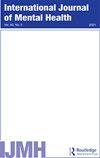Factors impeding psychiatrists from promoting smoking cessation among people with serious mental illness – A mixed methods study
IF 1.7
Q3 PSYCHOLOGY, CLINICAL
引用次数: 0
Abstract
Abstract Psychiatrists' beliefs and behaviors regarding smoking cessation promotion among people with serious mental illness (PWSMI) have been cited as a barrier for PWSMI achieving successful abstinence. A mixed methods approach was employed to evaluate beliefs and practices of psychiatrists affiliated with a large HMO in Israel regarding smoking cessation among PWSMI. Fifty psychiatrists (43% response rate) completed a telephone survey and thirty psychiatrists interviewed using a semi-structured questionnaire. Most of the psychiatrists (84%) saw smoking cessation promotion as part of their role, but in-depth interviews revealed that only a third were routinely pro-active, with over half believing that few PWSMI are willing or capable of quitting smoking. Most of the study population felt that an attempt to quit smoking would not adversely affect their patients' mental health status, but many raised concerns regarding the safety of smoking cessation medications (SCM) amongst PWSMI. Factors associated with pro-active practice were knowledge regarding services and SCM, characteristics of patient caseload (proportion low-functioning) and psychiatrist’s smoking behavior. Psychiatrist-targeted interventions highlighting safety of SCM and promoting referral to smoking cessation services are indicated. Offering PWSMI-specific harm reduction as a first step to abstinence may offer psychiatrists an acceptable treatment alternative for the low-functioning patient.阻碍精神病医生在患有严重精神疾病的人群中促进戒烟的因素-一项混合方法研究
本文章由计算机程序翻译,如有差异,请以英文原文为准。
求助全文
约1分钟内获得全文
求助全文
来源期刊

INTERNATIONAL JOURNAL OF MENTAL HEALTH
PSYCHOLOGY, CLINICAL-
CiteScore
3.80
自引率
20.00%
发文量
32
期刊介绍:
The official journal of the World Association for Psychosocial Rehabilitation, the International Journal of Mental Health features in-depth articles on research, clinical practice, and the organization and delivery of mental health services around the world. Covering both developed and developing countries, it provides vital information on important new ideas and trends in community mental health, social psychiatry, psychiatric epidemiology, prevention, treatment, and psychosocial rehabilitation.
 求助内容:
求助内容: 应助结果提醒方式:
应助结果提醒方式:


